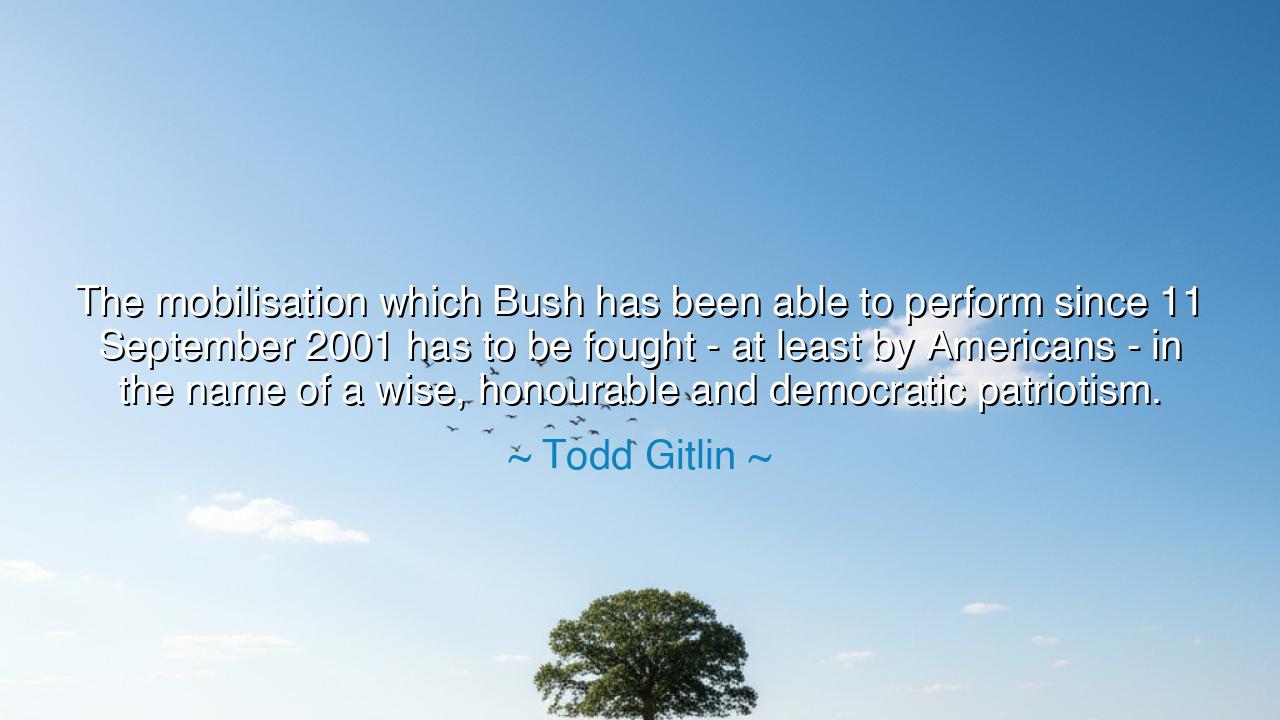
The mobilisation which Bush has been able to perform since 11
The mobilisation which Bush has been able to perform since 11 September 2001 has to be fought - at least by Americans - in the name of a wise, honourable and democratic patriotism.






The words of Todd Gitlin—“The mobilisation which Bush has been able to perform since 11 September 2001 has to be fought—at least by Americans—in the name of a wise, honourable and democratic patriotism.”—echo like a solemn bell rung in the twilight of an empire, summoning the people to remember the deeper meaning of love for country. For in times of crisis, when fear runs high and leaders seize upon the hearts of citizens, the call to patriotism may be twisted into a weapon that demands blind loyalty instead of thoughtful devotion. Gitlin warns us: not every mobilization is holy, and not every rallying cry in the name of the flag is worthy of obedience.
After the terror of September 11, 2001, President George W. Bush indeed stirred the American people into unity and action. Yet Gitlin points out that such mobilisation carried with it dangers: the danger of silencing dissent, the danger of equating criticism with treason, the danger of using fear to justify wars without end. It was a time when patriotism was too often measured not in wisdom, but in compliance; not in democracy, but in submission. In those days, many voices were hushed, and to question the government’s path was to risk being branded un-American. Thus Gitlin calls for another kind of patriotism—wise, honourable, and democratic—a patriotism that loves the nation enough to challenge its errors.
History bears witness to the peril of unchecked mobilization. Consider the story of Athens during the Peloponnesian War. The leaders, driven by fear of Sparta and lust for power, urged their people into reckless campaigns. The citizens, swept by fervor, silenced those who counseled caution. The disastrous Sicilian Expedition followed, a folly born not of weakness, but of misguided patriotism. Athens, once strong, was broken, and its glory dimmed. The lesson is ancient but eternal: when patriotism forgets wisdom, it destroys the very nation it seeks to defend.
And yet, there are brighter tales. Recall the civil rights movement in America, when ordinary citizens rose not in blind obedience but in courageous dissent. They challenged their nation, saying, “We love you too much to let you remain unjust.” Their patriotism was democratic, for it sought not domination but equality; it was honourable, for it risked hatred and violence for the sake of truth; it was wise, for it knew that only by correcting its injustices could the nation truly flourish. Their march, their song, their courage were the living embodiment of what Gitlin urged: a higher patriotism that holds a nation accountable to its soul.
The teaching is clear: patriotism is not silence, nor is it blind allegiance to leaders who cry for unity while stifling justice. True patriotism is the courage to ask, “Is this path worthy of our nation’s highest ideals?” It is to demand that our leaders govern with honour, that our wars be fought with wisdom, that our democracy not be sacrificed in the name of fear. When citizens forget this, governments grow reckless; when citizens remember, nations endure.
For us who inherit this lesson, the path is demanding but noble. We must cultivate vigilance in times of crisis, questioning not only the enemies beyond but the choices of our own leaders within. We must dare to dissent when conscience demands it, knowing that dissent born of love is itself an act of patriotism. We must gather our voices, not in unthinking compliance, but in thoughtful solidarity for justice and truth.
Thus, let Gitlin’s words be etched upon the heart: the mobilisation of fear is not enough. Only a wise, honourable, democratic patriotism can preserve a nation’s soul in times of peril. Let us go forth, then, not as silent followers of power, but as guardians of freedom—resisting when resistance is righteous, supporting when support is just, and always loving the homeland enough to hold it to its highest calling.






AAdministratorAdministrator
Welcome, honored guests. Please leave a comment, we will respond soon